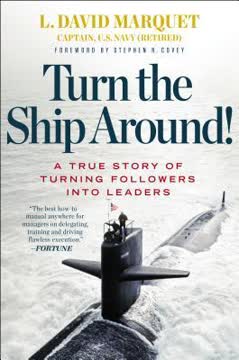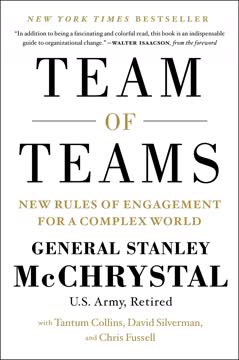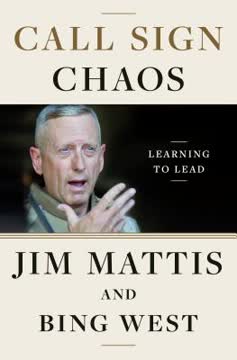Key Takeaways
1. Direct Leadership: Mastering the Basics of Command
Beneath its Prussian exterior of short haircuts, crisp uniforms, and exacting standards, the Corps nurtured some of the strangest mavericks and most original thinkers I would encounter in my journey through multiple commands, dozens of countries, and many college campuses.
Competence, Caring, and Conviction. Direct leadership, the foundation of Mattis's career, is built on three pillars: competence in one's craft, genuine care for the troops, and unwavering conviction in one's values. These qualities, honed through years of experience, form the bedrock of effective command at the personal level.
- Mastering the basics: Physical fitness, tactical knowledge, and clear communication are essential.
- Caring for troops: Knowing them as individuals, understanding their goals, and showing genuine concern.
- Conviction: Setting clear standards and sticking to them, while maintaining humility and compassion.
Leading by Example. Mattis emphasizes that a leader must be as tough as his toughest men, setting the standard for physical and mental fortitude. This approach builds trust and respect, essential for gaining the full commitment of troops.
- Physical toughness: Working out with the most fit, learning from the most cunning.
- Tactical soundness: Mastering fire support, map reading, and tactical cunning.
- Leading from the front: Being as tough as your troops, not concerned with how many books you've read.
Building a Fighting Spirit. Direct leadership is about reaching the souls of troops, instilling a sense of purpose and commitment. This is achieved through a combination of competence, caring, and conviction, creating a cohesive unit capable of dominating the battlefield.
- Instilling purpose: Creating a sense of belonging and shared mission.
- Building confidence: Ensuring troops know their leader is competent and won't waste their lives.
- Shaping the fighting spirit: Combining physical strength, mental agility, and spiritual resilience.
2. Executive Leadership: Scaling Influence Through Intent
In any organization, it’s all about selecting the right team.
Delegation and Trust. Executive leadership requires a shift from direct, face-to-face interaction to influencing through layers of command. This is achieved by clearly articulating intent and unleashing subordinate initiative, fostering a culture of trust and decentralized decision-making.
- Clear intent: Providing the "why" behind the mission, not just the "how."
- Decentralized authority: Empowering subordinates to make decisions based on the commander's intent.
- Trust in subordinates: Believing in their capabilities and allowing them to act independently.
Command and Feedback. Effective executive leadership relies on a "command and feedback" approach, rather than "command and control." This involves clearly stating intent, unleashing initiative, and then using feedback loops to address obstacles and challenges.
- Clear goals: Defining the mission as a shared responsibility, not just the commander's.
- Effective coaching: Providing guidance and support to subordinate commanders.
- Feedback loops: Using data and information to identify and fix problems.
Building a Team. Selecting the right team is paramount, valuing initiative and aggressiveness above all. Institutions get the behaviors they reward, and executive leaders must create a culture that fosters these qualities.
- Rewarding initiative: Valuing those who take action and seize opportunities.
- Aggressiveness: Encouraging a bias for action and a willingness to take risks.
- Ethical standards: Holding everyone to the same high standards of honesty and integrity.
3. Strategic Leadership: Aligning Military Might with Political Aims
When it comes to the defense of our experiment in democracy and our way of life, ideology should have nothing to do with it.
Civilian-Military Interaction. Strategic leadership involves reconciling the grim realities of war with the aspirations of political leaders. Military leaders must understand the political context and ensure that military actions align with broader policy goals.
- Understanding political goals: Aligning military actions with the desired political outcomes.
- Reconciling realities: Balancing the harsh realities of war with political aspirations.
- Serving the public trust: Remaining a steward of the public trust, regardless of political affiliation.
Strategic Thinking. Strategic leaders must be able to see the big picture, anticipate future threats, and develop long-term plans. This requires a deep understanding of history, economics, and international relations.
- Defining threats: Identifying the main threats to the country and adapting to a changing world.
- Adapting to change: Adjusting military education, budget, and leadership selection to address new challenges.
- Creating options: Using historical knowledge to create options and avoid being a victim of circumstance.
The Importance of a Clear End State. Strategic leaders must define a clear, achievable end state and ensure that all actions are aligned toward that goal. This requires a deep understanding of the political context and the ability to avoid mission creep.
- Clear objectives: Defining a clear, limited end state for military operations.
- Avoiding overreach: Knowing when to stop fighting and avoid mission creep.
- Diplomatic solutions: Using diplomacy to pull together coalitions and achieve strategic goals.
4. The Power of Reading: Learning from History's Lessons
If you haven’t read hundreds of books, you are functionally illiterate, and you will be incompetent, because your personal experiences alone aren’t broad enough to sustain you.
History as a Guide. Reading history is essential for leaders, providing a depth of understanding that illuminates the path ahead. By studying the successes and failures of past leaders, we can avoid repeating mistakes and create better options.
- Learning from others: Studying how others have dealt with similar challenges.
- Avoiding mistakes: Learning from the mistakes of past leaders rather than repeating them.
- Creating options: Using historical knowledge to create options and avoid being a victim of circumstance.
Expanding Horizons. Reading expands our horizons, exposing us to different perspectives and ways of thinking. This is crucial for developing the intellectual agility needed to adapt to changing circumstances.
- Intellectual freedom: Nurturing intellectual freedom and imaginative solutions.
- Critical thinking: Developing the ability to analyze situations and make sound judgments.
- Historical depth: Gaining a deeper understanding of the present by studying the past.
The Value of Mentorship. Reading is a form of mentorship, allowing us to learn from the experiences of those who have come before us. By studying the lives and writings of great leaders, we can accelerate our own development.
- Learning from veterans: Asking veterans about their experiences and reading relentlessly.
- Mentoring techniques: Adopting mentoring techniques to expand the horizons of others.
- Expanding understanding: Accelerating understanding of combat by studying leadership examples.
5. The Importance of Allies: Strength in Shared Purpose
Everywhere we sailed, at every landing and every exercise in foreign countries, I was introduced to the enormous value of allies.
The Value of Collaboration. Allies are an irreplaceable asset, providing diverse perspectives, unique skills, and shared burdens. By working together, nations can achieve more than they could alone.
- Learning from others: Gaining different perspectives and effective fighting styles from allies.
- Shared burdens: Distributing the costs and risks of military operations.
- Irreplaceable benefit: Recognizing the value of learning from others and working together.
Building Trust. Trust is the foundation of any successful alliance. By building strong relationships with allies, we can create a network of support that enhances our collective security.
- Mutual confidence: Building confidence in one another's fighting spirit.
- Shared understanding: Developing a common understanding of goals and objectives.
- Operations at the speed of trust: Recognizing that operations occur at the speed of trust.
The Power of Unity. A unified coalition is more powerful than any single nation. By working together, allies can create a force that is feared by foes and embraced by friends.
- Shared mission: Creating a sense of shared purpose and commitment.
- Collective strength: Recognizing that a unified coalition is more powerful than any single nation.
- Global reach: Understanding the value of a global network of allies.
6. The Tyranny of Distance: Adapting to the Unforeseen
The Marines teach you, above all, how to adapt, improvise, and overcome.
Adaptability as a Core Skill. The ability to adapt, improvise, and overcome is essential for success in any field, but especially in the military. Leaders must be able to respond quickly and effectively to changing circumstances.
- Improvisation: Developing the ability to adapt to unexpected challenges.
- Overcoming obstacles: Finding creative solutions to problems.
- Flexibility: Being able to shift gears and change course when necessary.
The Importance of Planning. While adaptability is crucial, it must be grounded in sound planning. Leaders must anticipate potential challenges and develop contingency plans to address them.
- Contingency planning: Developing plans to address potential setbacks and challenges.
- Rehearsals: Practicing maneuvers and drills until they become second nature.
- Anticipating the unexpected: Preparing for the unexpected and developing mental models for dealing with chaos.
The Need for Speed. In a rapidly changing world, speed is of the essence. Leaders must be able to make decisions quickly and effectively, without getting bogged down in bureaucracy.
- Bias for action: Developing a strong bias for action and a willingness to take risks.
- Decentralized decision-making: Empowering subordinates to make decisions quickly and effectively.
- Operational tempo: Maintaining a high operational tempo to keep the enemy off-balance.
7. The Moral Dimension of War: Ethics and the Warrior's Code
To be a good soldier you must love the army. But to be a good officer you must be willing to order the death of the thing you love.
The Weight of Command. Leaders must be willing to make difficult decisions, including ordering troops into harm's way. This requires a deep sense of responsibility and a commitment to ethical conduct.
- Moral responsibility: Understanding the moral implications of command decisions.
- Compartmentalizing emotions: Separating personal feelings from professional duties.
- Focus on the mission: Prioritizing the mission above personal concerns.
The Importance of Ethics. Ethical conduct is essential for maintaining the trust and respect of troops and the public. Leaders must hold themselves and their subordinates to the highest standards of integrity.
- Ethical standards: Holding everyone to the same high standards of honesty and integrity.
- Avoiding favoritism: Treating all troops fairly and without bias.
- Maintaining a moral compass: Ensuring that actions are guided by a strong moral compass.
The Human Cost of War. Leaders must never forget the human cost of war. They must be mindful of the sacrifices made by troops and their families, and they must strive to minimize casualties whenever possible.
- Respect for the fallen: Honoring the sacrifices of those who have died in service.
- Caring for the wounded: Ensuring that wounded troops receive the best possible care.
- Minimizing casualties: Taking all possible steps to minimize casualties and protect innocent lives.
8. The Value of Initiative: Unleashing Subordinate Potential
Institutions get the behaviors they reward.
Empowering Subordinates. Leaders must empower their subordinates to take initiative and make decisions independently. This requires a culture of trust and a willingness to tolerate mistakes.
- Decentralized decision-making: Empowering subordinates to make decisions based on the commander's intent.
- Rewarding initiative: Valuing those who take action and seize opportunities.
- Tolerating mistakes: Recognizing that mistakes are part of the learning process.
Creating a Bias for Action. Leaders must foster a culture that values action and encourages troops to take the initiative. This requires a clear understanding of the mission and a willingness to take risks.
- Clear intent: Providing the "why" behind the mission, not just the "how."
- Aggressiveness: Encouraging a bias for action and a willingness to take risks.
- Seizing opportunities: Empowering subordinates to take advantage of fleeting opportunities.
The Importance of Trust. Trust is essential for unleashing subordinate initiative. Leaders must trust their subordinates to make sound decisions, and subordinates must trust their leaders to support them.
- Trust in subordinates: Believing in their capabilities and allowing them to act independently.
- Trust up and down the chain: Building a culture of trust at all levels of the organization.
- Supporting subordinates: Standing by subordinates when they make mistakes while doing their best.
9. The Art of Persuasion: Building Trust and Common Ground
I learned the art of persuasion, creating common ground where none seemed to exist and gaining the confidence of a young person terrified of the legendary Marine drill instructor.
Finding Common Ground. Persuasion is about finding common ground, even when it seems impossible. Leaders must be able to connect with others on a personal level and build relationships based on trust and mutual respect.
- Empathy: Understanding the perspectives and concerns of others.
- Building relationships: Creating connections based on trust and mutual respect.
- Creating common ground: Finding areas of agreement and shared interest.
The Power of Listening. Effective persuasion requires active listening. Leaders must be willing to hear out different points of view and to learn from others' experiences.
- Active listening: Paying attention to what others have to say.
- Seeking feedback: Soliciting input from others and being open to criticism.
- Learning from others: Recognizing that everyone has something to offer.
The Importance of Persuasion. Persuasion is a critical leadership skill, especially in complex and challenging situations. Leaders must be able to influence others to support their vision and to work together toward a common goal.
- Gaining confidence: Persuading others to believe in your vision and your leadership.
- Creating common ground: Finding areas of agreement and shared interest.
- Building consensus: Working with others to achieve a common goal.
10. The Imperative of Adaptability: Thriving in Chaos
You make mistakes, or life knocks you down; either way, you get up and get on with it. You deal with life. You don’t whine about it.
Embracing Change. Adaptability is essential for success in a rapidly changing world. Leaders must be willing to embrace change and to adjust their plans as needed.
- Flexibility: Being able to shift gears and change course when necessary.
- Improvisation: Developing the ability to adapt to unexpected challenges.
- Openness to new ideas: Being willing to consider new approaches and perspectives.
Learning from Mistakes. Mistakes are inevitable, but they can also be valuable learning opportunities. Leaders must be willing to admit their mistakes and to learn from them.
- Honesty: Being honest about mistakes and moving on.
- Learning from setbacks: Using setbacks as opportunities to refine your approach.
- Resilience: Bouncing back from adversity and continuing to move forward.
The Importance of Resilience. Resilience is the ability to bounce back from adversity. Leaders must be able to maintain their composure in the face of challenges and to inspire their troops to do the same.
- Maintaining composure: Remaining calm and focused in the face of adversity.
- Inspiring others: Motivating troops to persevere through difficult times.
- Dealing with life: Accepting that life will knock you down, but you must get up and get on with it.
Last updated:
FAQ
What's Call Sign Chaos: Learning to Lead about?
- Leadership Journey: The book chronicles Jim Mattis's evolution from a carefree youth to a disciplined leader in the Marine Corps, highlighting his experiences and lessons learned.
- Three Leadership Levels: It is structured into three parts: Direct Leadership, Executive Leadership, and Strategic Leadership, each focusing on different military leadership aspects.
- Real-World Applications: Mattis shares insights on applying military leadership principles in civilian life, emphasizing adaptability, initiative, and team dynamics.
Why should I read Call Sign Chaos: Learning to Lead?
- Unique Perspective: Jim Mattis offers a rare insider's view of military leadership, providing lessons applicable beyond the battlefield to various civilian leadership roles.
- Rich Anecdotes: The book is filled with personal stories and historical references that illustrate key leadership principles, making it both informative and engaging.
- Timeless Lessons: Readers can gain insights into the importance of competence, caring, and conviction in leadership, essential qualities in any field.
What are the key takeaways of Call Sign Chaos: Learning to Lead?
- Competence is Crucial: Mastering the basics of your profession is essential for effective leadership, with continuous improvement in skills and knowledge emphasized.
- Caring for Your Team: Demonstrating genuine concern for team members fosters loyalty and commitment, as Mattis states, “Nobody cares how much you know, until they know how much you care.”
- Decentralized Decision-Making: Empowering subordinates to make decisions fosters initiative and agility, vital in both military and civilian contexts.
What are the best quotes from Call Sign Chaos: Learning to Lead and what do they mean?
- “Politics ends at the water’s edge.”: This underscores the importance of unity and non-partisanship in national defense, suggesting military leaders serve the country regardless of political affiliations.
- “You don’t get to choose when you die, but you do choose how you meet death.”: Reflects the mindset of facing challenges head-on and embracing leadership and combat realities.
- “No better friend, no worse enemy.”: Encapsulates the dual nature of military engagement, emphasizing ethical conduct while being resolute against adversaries.
How does Jim Mattis define effective leadership in Call Sign Chaos: Learning to Lead?
- Competence, Caring, and Conviction: Mattis identifies these qualities as essential for effective leadership, with leaders needing to be skilled, show genuine concern, and have a strong moral compass.
- Adaptability: Effective leaders must adjust strategies based on the situation, crucial in both military operations and civilian leadership.
- Team Selection: Emphasizes selecting team members based on initiative and aggressiveness, contributing to organizational success.
What leadership styles does Jim Mattis discuss in Call Sign Chaos: Learning to Lead?
- Direct Leadership: Involves close engagement with teams, fostering personal relationships and direct communication, as seen in Mattis's early years leading Marines.
- Executive Leadership: Managing larger organizations requires adapting communication and leadership styles to ensure intent is understood across command layers.
- Strategic Leadership: Navigating complex interactions between military and political spheres, balancing operational realities with broader strategic goals.
How does Call Sign Chaos: Learning to Lead address the concept of adaptability?
- Adapting to Change: Mattis discusses how the Marine Corps teaches leaders to adapt, improvise, and overcome challenges, crucial in dynamic environments.
- Learning from Mistakes: Mistakes are viewed as learning opportunities, encouraging leaders to take calculated risks and innovate.
- Historical Context: Historical examples illustrate how adaptability has been key to successful military campaigns, reinforcing the need for strategic pivots.
What role does teamwork play in Call Sign Chaos: Learning to Lead?
- Building Trust: Effective teamwork is built on trust and mutual respect, with leaders fostering an environment where everyone feels valued and empowered.
- Shared Goals: Aligning the team around a common mission ensures everyone understands their role in achieving that mission.
- Collective Responsibility: Successful teams operate with a sense of collective responsibility, where each member is accountable for their contributions to success.
How does Jim Mattis view the relationship between military and civilian leadership in Call Sign Chaos: Learning to Lead?
- Shared Values: Both military and civilian leaders should uphold core values of integrity, service, and commitment to the nation, crucial for effective governance.
- Collaboration: Emphasizes collaboration between military and civilian leaders, particularly in crises, with effective communication and mutual respect essential.
- Political Neutrality: Advocates for a non-partisan approach to military service, emphasizing service to the nation regardless of political affiliations.
What challenges did Mattis face during his military career as described in Call Sign Chaos: Learning to Lead?
- Complex Warfare Environments: Navigated irregular warfare complexities in Iraq and Afghanistan, adapting to rapidly changing conditions and insurgent tactics.
- Political Constraints: Encountered political constraints limiting military options, balancing aggressive strategies with political approval and public support.
- Maintaining Morale: Focused on maintaining troop morale amid prolonged conflict, emphasizing leadership and camaraderie to keep the fighting spirit alive.
How does Call Sign Chaos: Learning to Lead reflect on the importance of history in military leadership?
- Learning from the Past: Highlights the value of studying history to inform current military strategies, providing insights into effective leadership and decision-making.
- Avoiding Past Mistakes: Serves as a cautionary tale about the consequences of ignoring historical lessons, with repeated mistakes leading to strategic failures.
- Contextualizing Current Conflicts: By placing contemporary conflicts within a historical framework, Mattis provides a deeper understanding of complexities involved.
What role do allies play in the strategies discussed in Call Sign Chaos: Learning to Lead?
- Strengthening Coalitions: Strong alliances are essential for successful military operations, with collaborative efforts enhancing operational effectiveness.
- Shared Burden: Discusses the importance of sharing military operations' burden with allies, pooling resources and capabilities for enhanced combat effectiveness.
- Building Trust and Cooperation: Stresses the need for trust and cooperation among allied forces, crucial for achieving common objectives and maintaining stability.
Review Summary
Call Sign Chaos receives largely positive reviews for its insights on leadership and military strategy. Readers praise Mattis's emphasis on reading, learning from history, and developing competent, caring leaders. Many appreciate his candid accounts of military campaigns and decision-making processes. Some criticize the book for being dry at times or lacking personal details. While a few reviewers expected more commentary on recent politics, most found value in Mattis's leadership philosophy and military experiences. The book is recommended for those interested in leadership, military history, and Mattis's career.
Similar Books










Download PDF
Download EPUB
.epub digital book format is ideal for reading ebooks on phones, tablets, and e-readers.




